Leadership Project Part 2: Professional Development
Introduction
Professional development was aimed at guiding teachers in grades K-8 through as well as content area teachers through the process of understanding, adopting and implementing the Common Core State Standards specifically in ELA, Reading.
Evolution
A professional development calendar was developed by the CCSS ELA Moderator along with administration at the beginning of the 2013-2014 school year. Professional development included all K-8 homeroom teachers as well as content area teachers (17 faculty members total). It was important to include all staff in professional development meetings from the beginning and as professional development progressed to ensure collective understanding and consistency in application of the Common Core Standards.
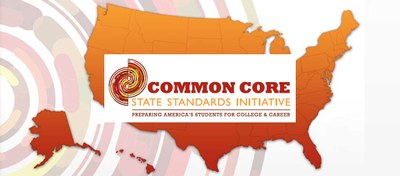 At the beginning of the 2013-2014 school year the goal of professional development was to help teachers understand the rationale and shifts within CCSS and begin implementation of ELA: Reading, Speaking & Listening as well as Language Standards. As the year progressed however, it became clear teachers, although engaged and productive, needed more time to complete grade level reading assessments and work on rubrics aligned with created assessments. Thus, the calendar was changed and Speaking & Listening as well as Language CCSS were eliminated from the 2013-2014 professional development schedule. These sets of Common Core State Standards were excluded from professional development to allow enough time for teachers to work on grade level reading assessments for both informational and literary text and also work on corresponding rubrics as well.
At the beginning of the 2013-2014 school year the goal of professional development was to help teachers understand the rationale and shifts within CCSS and begin implementation of ELA: Reading, Speaking & Listening as well as Language Standards. As the year progressed however, it became clear teachers, although engaged and productive, needed more time to complete grade level reading assessments and work on rubrics aligned with created assessments. Thus, the calendar was changed and Speaking & Listening as well as Language CCSS were eliminated from the 2013-2014 professional development schedule. These sets of Common Core State Standards were excluded from professional development to allow enough time for teachers to work on grade level reading assessments for both informational and literary text and also work on corresponding rubrics as well.
By the end of the 2013-2014 school year each grade will have two completed grade level reading assessments, an informational text as well as a literary text assessment, along with rubrics for each assessment. Professional development concerning speaking and listening as well as language CCSS will take place across the 2014-2015 school year.
Schedule
The schedule listed below shows the dates used for professional development with K-8 faculty pertaining to the Common Core State Standards specifically in ELA, Reading. Meetings began at 1:45pm and ended at 3:30pm giving teachers more or less an hour and a half, after general administrative announcements, to participate and engaged in professional development. Two days, March 14 and April 11, were planned for CCSS meetings at the beginning of the year but were cancelled by administration. March 14 was cancelled for a guest speaker and April 11 was cancelled to allow teachers time to work on planning and third trimester grades. In addition to professional development Fridays faculty also worked on Common Core Standards assessments and rubrics during Monday grade level meetings. These collaborative meetings took place on Monday afternoons from 3:10-4:00pm. During both Friday and Monday meetings administration as well as the CCSS ELA Moderator completed instructional rounds observing teachers in their meetings and providing input and feedback as well.
to the Common Core State Standards specifically in ELA, Reading. Meetings began at 1:45pm and ended at 3:30pm giving teachers more or less an hour and a half, after general administrative announcements, to participate and engaged in professional development. Two days, March 14 and April 11, were planned for CCSS meetings at the beginning of the year but were cancelled by administration. March 14 was cancelled for a guest speaker and April 11 was cancelled to allow teachers time to work on planning and third trimester grades. In addition to professional development Fridays faculty also worked on Common Core Standards assessments and rubrics during Monday grade level meetings. These collaborative meetings took place on Monday afternoons from 3:10-4:00pm. During both Friday and Monday meetings administration as well as the CCSS ELA Moderator completed instructional rounds observing teachers in their meetings and providing input and feedback as well.
The schedule listed below outlines the progression of the Professional Development regarding CCSS ELA: Reading. Links to powerpoint and Prezi presentations used during professional development periods are provided as resources.
August 18: Articulating Root Beliefs
September 20: CCSS Rationale Behind the Standards: 6 Shifts, Expectations, Principles
September 27 - November 22: CCSS ELA Reading Structure and Vertical Analysis: Unpacking the Standards
November 22: Assessment: Begin creating grade level reading assessments aligned with CCSS
February 21: Grade Level Reading Assessments due - two per grade level, one informational assessment and one literary assessment
March 21, March 28, May 9, May 16, May 30: CCSS ELA Reading: Developing Rubrics
Unpacking Standards
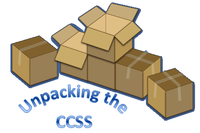 Teachers were assigned to work in "unpacking teams" based on content area knowledge, grade level experience as well as experience with the standards and unpacking them. Teams were formed and teachers worked collaboratively to unpack the standards for each grade level. It was important to have members of the various grade levels and content areas present on each team to ensure consistency and rigor from grade to grade. An unpacking professional development seminar took place with all faculty members on Friday, September 27th, and a template was provided to teachers to help them through the process. Unpacking the standards began in September and was completed on November 22. Unpacking Teams used professional development time scheduled on Fridays from 1:45-3:30pm as well as professional development time on Monday from 3:10-4:00pm to complete their work. Completed unpacking standards for each grade level (K-8) are provided using the links below:
Teachers were assigned to work in "unpacking teams" based on content area knowledge, grade level experience as well as experience with the standards and unpacking them. Teams were formed and teachers worked collaboratively to unpack the standards for each grade level. It was important to have members of the various grade levels and content areas present on each team to ensure consistency and rigor from grade to grade. An unpacking professional development seminar took place with all faculty members on Friday, September 27th, and a template was provided to teachers to help them through the process. Unpacking the standards began in September and was completed on November 22. Unpacking Teams used professional development time scheduled on Fridays from 1:45-3:30pm as well as professional development time on Monday from 3:10-4:00pm to complete their work. Completed unpacking standards for each grade level (K-8) are provided using the links below:
Kindergarten, 1st Grade, 2nd Grade, 3rd Grade, 4th Grade, 5th Grade, 6th Grade, 7th Grade, 8th Grade
Data and Observations
A pre-survey was given to faculty on September 27, 2013 to assess general knowledge about the Common Core Standards. The survey was distributed electronically via SurveyMonkey and consisted of short answer, scale and multiple choice questions. The survey results were used to gauge current faculty knowledge and understanding of the Common Core State Standards specifically the ELA CCSS to guide 2013-2014 professional development and training concerning the standards. Pre-surevey results for Question 1: "Why have CCSS been created?" and Question 2: "How familiar are you with the Common Core State Standards (CCSS)?" are presented below.
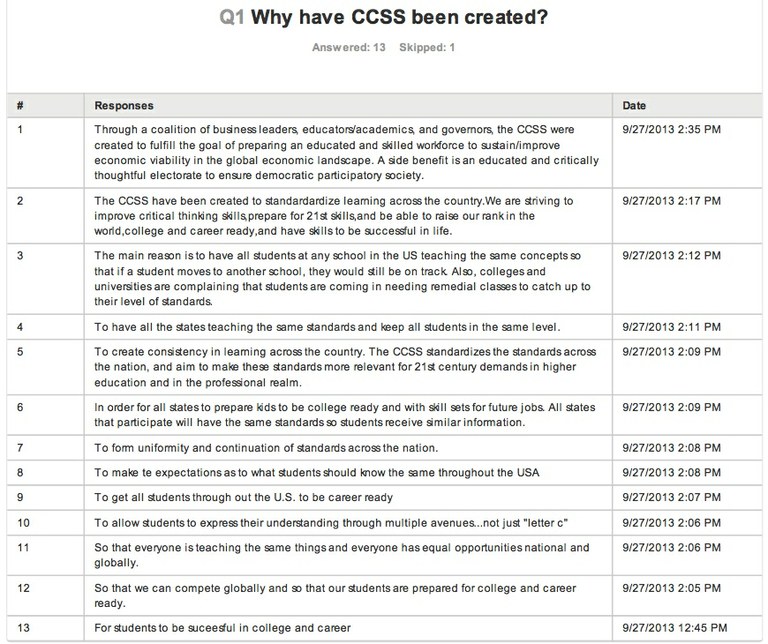
In addition, the survey obtained prior knowledge from teachers about the CCSS in ELA, the shifts in the ELA standards and the organization and vertical analysis of the standards the topic for the second training. The results of the survey show a split amongst staff members who know and do not know what the College and Career Readiness Anchor Standards are. In addition, teachers surveyed showed mixed results in their ability to identify the clusters within the ELA standards with only 46.15% of teachers able to identify all six clusters. These results pointed to the need for professional development regarding the structure, organization and vertical analysis of the CCS. The survey results not only identified the need for professional development but also allow for tracking of teacher growth throughout the year as they participate in professional development. Further surveys and results were used in a similar way to assess previous training and guide professional development.
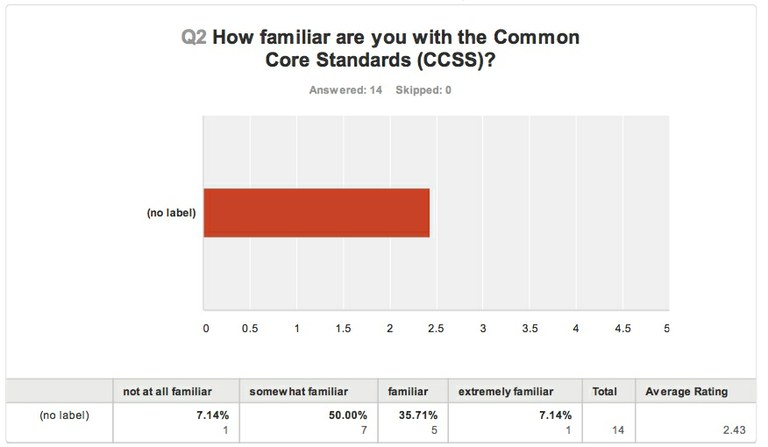
All survey results are provided via PDF following the link: Pre-survey Results. In analyzing the data from the pre-survey it was clear that the faculty had varying levels of knowledge and experience in dealing with CCSS. Thus it was important as a professional development leader to guide everyone through the process, use educators as professionals and ensure that all aspects of CCSS were explained explicitly to ensure collective understanding.
Reflection
At the beginning of the 2013-2014 school year I was apprehensive to be considered a leader on-
campus and take ownership of professional development, especially concerning a major shift in policy, the Common Core State Standards. I worried that as a middle school teacher and one of the younger teachers on-campus that people would not perceive me as a leader nor would they accept me as a leader or trust my expertise. I was also apprehensive in dealing with my colleagues and concerned about push back from the faculty concerning the purpose of me leading professional development.
I was delighted to see after professional development on September 20, in which I led a meeting concerning the rationale behind CCSS, that teachers were not only engaged in the process of professional development but enthusiastic about Common Core and about me guiding the training. Having a fresh face and a new perspective was nice for faculty members and they enjoyed participating in professional development that they considered "relevant" the classroom, their teaching and the school. This motivated me and gave me the confidence and reassurance I needed to work, guide and support faculty through professional development of CCSS.
Though professional development will continue for the duration of the year as I reflect back on my facilitation I see the importance of communication and empowerment. I used various methods of communication email, informal and formal conferences, observations, etc. to communicate with all faculty about the purpose, adoption and implementation of CCSS. It was important to not only  communicate about CCSS but also to keep faculty informed about progress, schedules and be as transparent as possible with the big picture concerning Common Core. As a result of this communication, sharing of information and transparency the faculty were empowered not just to complete work and implement Common Core as a requirement but to impact change and positively effect student learning. Although the schedule changed and not all topics, as first proposed, were discussed in professional development the faculty continues to show enthusiasm for the topic and with the expertise and knowledge they have gained this year should start strong next year in implementing CCSS ELA: Speaking & Listening, Language. These and future modifications will always need to be made as changes arrive so it is important to be flexible, understanding and know your staff as well as their limits when implementing change.
communicate about CCSS but also to keep faculty informed about progress, schedules and be as transparent as possible with the big picture concerning Common Core. As a result of this communication, sharing of information and transparency the faculty were empowered not just to complete work and implement Common Core as a requirement but to impact change and positively effect student learning. Although the schedule changed and not all topics, as first proposed, were discussed in professional development the faculty continues to show enthusiasm for the topic and with the expertise and knowledge they have gained this year should start strong next year in implementing CCSS ELA: Speaking & Listening, Language. These and future modifications will always need to be made as changes arrive so it is important to be flexible, understanding and know your staff as well as their limits when implementing change.
Supporting Documents
Pre/Post Professional Development Faculty E-mails
CPSEL CONNECTION
Standard 1: Facilitating the development, articulation, implementation, and stewardship of a vision of learning that is shared and supported by the school community.
- 1.1 Develop a shared vision
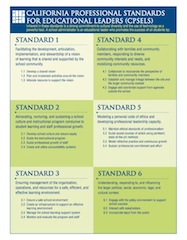
- 1.2 Plan and implement activities around the vision
- 1.3 Allocate resource to support the vision
Standard 2: Advocating, nurturing, and sustaining a school culture and instructional program conducive to student learning and staff professional growth.
- 2.1 Develop school culture and ensure equity
- 2.2 Guide the instructional program
- 2.3 Guide professional growth of staff
- 2.4 Create and utilize accountability systems
Standard 3: Ensuring management of the organization, operations, and resources for a safe, efficient, and effective learning environment.
- 3.1 Ensure a safe school environment
- 3.2 Create an infrastructure to support an effective learning environment
- 3.3 Manage the school learning-support system
- 3.4 Monitor and evaluate the program and staff
- 4.1 Collaborate to incorporate the perspective of families and community members
- 4.3 Engage and coordinate support from agencies outside the school
Standard 5: Modeling a personal code of ethics and developing professional leadership capacity.
- 5.1 Maintain ethical standards of professionalism
- 5.2 Guide sound courses of action using pertinent, state-of-the-art methods
- 5.3 Model reflective practice and continuous growth
- 5.4 Sustain professional commitment and effort
Standard 6: Understanding, responding to, and influencing the larger political, social, economic, legal, and cultural context.
- 6.1 Engage with the policy environment to support school success
- 6.2 Interact with stakeholders
- 6.3 Incorporate input from the public

